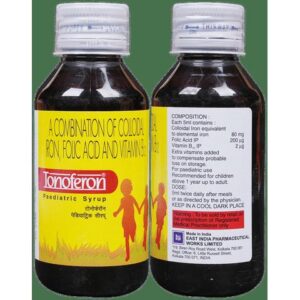FOLIC ACID + VIT B12 + COLLOIDAL IRON
Folic Acid: Folic acid, also known as vitamin B9, is a synthetic form of folate, a water-soluble vitamin that plays a crucial role in various bodily functions. It is commonly used as a dietary supplement to meet the body’s folic acid requirements.
The primary use of folic acid is in the prevention and treatment of folate deficiency, which can occur due to poor dietary intake, certain medications, or medical conditions that interfere with proper absorption. Folic acid is particularly important during pregnancy as it helps in the formation of the baby’s neural tube and prevents certain birth defects.
The mechanism of action of folic acid involves its conversion into its active form, tetrahydrofolate (THF), in the body. THF is necessary for the synthesis of DNA, RNA, and proteins, as well as for the production of red blood cells. Folic acid also plays a role in the metabolism of homocysteine, an amino acid that can increase the risk of cardiovascular diseases if present in high levels.
The recommended dose of folic acid varies depending on the age, sex, and specific needs of an individual. In general, adult males and non-pregnant females require around 400 micrograms (mcg) of folic acid per day. Pregnant women and individuals with certain medical conditions may require higher doses as prescribed by their healthcare provider.
Folic acid is generally considered safe and well-tolerated when taken orally. However, like any medication, it can cause some side effects. Common side effects include nausea, bloating, flatulence, and a yellow discoloration of urine. In rare cases, individuals may experience allergic reactions, such as rash, itching, or swelling of the face, lips, or tongue. It is important to consult a healthcare professional if any unusual or severe side effects occur.
It’s worth noting that folic acid supplementation may interact with certain medications, so it is essential to inform healthcare providers about all the medications and supplements being taken to avoid potential interactions.
Vit B12: Drug Name: Vitamin B12 (Cyanocobalamin)
Use: Vitamin B12 is essential for the formation of red blood cells and the proper functioning of the nervous system. It is used to treat vitamin B12 deficiency, pernicious anemia, and certain types of nerve damage.
Mechanism of Action: Vitamin B12 is a water-soluble vitamin that is necessary for the synthesis of DNA, the genetic material of cells. It plays a crucial role in the production of red blood cells and the maintenance of nerve function. Cyanocobalamin, the synthetic form of vitamin B12, is converted into its active form (methylcobalamin) in the body and is then utilized in various enzymatic reactions.
Dose: The dose of vitamin B12 may vary depending on the condition being treated. In general, the recommended daily oral dose for adults is 2.4 micrograms. For vitamin B12 deficiency, the initial dose may be higher, often given as an intramuscular injection of 1,000 mcg, followed by maintenance doses of 100-200 mcg every month.
Side Effects: Vitamin B12 is generally considered safe and well-tolerated. Common side effects of high-dose supplementation include diarrhea, nausea, and stomach upset. Rare but severe allergic reactions may occur. In some cases, high doses of vitamin B12 may cause hypokalemia (low potassium levels), fluid retention, or abnormalities in blood clotting.
It’s important to note that vitamin B12 should be used under the guidance of a healthcare professional, especially in individuals with specific medical conditions or those taking certain medications.
Colloidal Iron: Colloidal Iron, also known as Iron Hydroxide Sucrose Complex, is a medication used for the treatment of iron deficiency anemia. It is administered intravenously.
The mechanism of action of Colloidal Iron involves the supplementing of iron stores in the body. Iron is an essential element required for the production of red blood cells and the transportation of oxygen within the body. In cases of iron deficiency anemia, there is a decreased level of iron in the body, which leads to a reduction in red blood cell production and oxygen-carrying capacity. Colloidal Iron helps to replenish iron stores and stimulate the production of red blood cells, ultimately improving the symptoms of anemia.
The dosage of Colloidal Iron generally depends on the severity of the anemia and the specific patient characteristics. It is typically administered as an intravenous infusion, given slowly over a period of time. The infusion is usually done in a healthcare setting under the supervision of a healthcare professional.
While Colloidal Iron is generally considered safe, there are some potential side effects that can occur. Common side effects may include headache, dizziness, nausea, vomiting, abdominal pain, and diarrhea. In rare cases, allergic reactions such as rash, itching, swelling, or difficulty breathing may occur. It is important to immediately report any allergic reactions or severe side effects to a healthcare provider.
Overall, Colloidal Iron is an effective and commonly used medication for the treatment of iron deficiency anemia. However, it is essential to follow the prescribed dosage and to report any concerning side effects to a healthcare professional for appropriate management.

